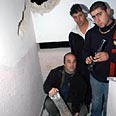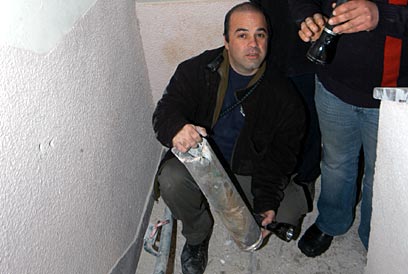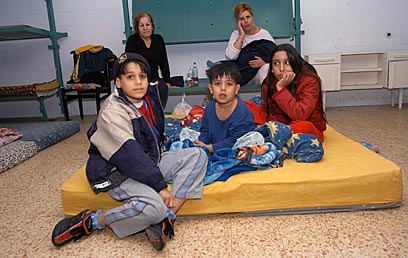
IDF strikes in Lebanon
Air Force bombs Popular Front training base south of Beirut; earlier, at least six rockets fired at northern Israel communities, two homes hit, four residents suffer from shock. Locals ordered into bomb shelters, gunships dispatched to locate origin of fire
IDF response: The Air Force struck a Popular Front - General Command training base south of Beirut early Wednesday in response to the rocket attack on northern Israel communities late Tuesday.
Eyewitnesses in Lebanon said fighter jets fired two missiles at the camp, located about seven kilometers (approximately 4 miles) south of the Lebanese capital. Several Popular Front members were lightly hurt in the strike, a group representative said.
Lebanese troops in the area confirmed an aerial attack took place and sealed off the area to journalists.
The IDF should offer a measured response to the rocket attack on northern Israel Tuesday night, IDF Northern Command Head Udi Adam told reporters, adding "there is no need for winds of war."
However, Adan noted: "The message has been relayed to Lebanon and if they don't take care (of this), we will."
The IDF official added the direct rocket hits sustained by Israeli homes Tuesday night did not attest to new capabilities acquired by the group behind the attack.
"There's no new technology here," he said. "Those are the same old bombs the residents know well."
However, Adam added: "There was a big miracle here."
Earlier, the army said "the firing of rockets at the State of Israel is an incident marking a blatant, severe attack from Lebanese territory on an Israeli community and Israeli citizens."
"The responsibility for the rocket fire at the State of Israel lies with the Lebanese government, which is not doing anything to dismantle terror organizations and armed militias operating on its territory, in contradiction to United Nations resolutions 425 and 1559," the army added. "The IDF will act decisively to defend the citizens of Israel from terror group belligerence originating in Lebanese territory."
Northern town under fire
Earlier, six Katyusha rockets were fired at the northern town of Kiryat Shmona, three landing in town and another three in an open field.
One of the rockets hit the staircase of a three-storey building. Two people suffered from shock as a result of the attack.
Oshri Swissa, a resident of the building hit told Ynet, “I sat downstairs with friends, we heard a loud explosion and the electricity was cut off. We’ve been living here for years and therefore quickly realized that it was a shell."
"It entered the block and damaged the staircase, cutting off electricity along the way," he added.

Damage to residential building (Photo: Avihu Shapira)
The second Katyusha hit a nearby house, landing in the living room which was completely destroyed as a result. While the family dog was seriously injured in the attack, the home owners were treated for shock at a local clinic.
Police sappers and security forces arrived at the scene minutes after the attack and helicopters were dispatched to locate where the Katyushas had been fired from.
Hizbullah denies responsibility
Meanwhile, explosions were reported
in the western Galilee community of Shlomi. Security forces are currently examining the cause of the blasts.
Residents in both communities were told to enter local bomb shelters for fear of further strikes.
Northern Command Chief Udi Adam is currently holding a meeting to evaluate the situation.
The IDF estimates a Palestinian organization was behind the rocket attack on Israel's northern region Tuesday night.
"It is still early to draw conclusions, but it is very possible that a Palestinian group carried out the attack. In this way, the Hizbullah is not implicated, and it draws Israel into responding against it, thus bringing about an escalation," an army source explained.
In conversation with an al-Jazeera correspondent in Beirut earlier, Hizbullah sources denied the organization was behind the rocket attack on Kiryat Shmona. Fatah members in Lebanon also said they were not responsible for the firing.
IDF received no prior warnings
Renewed tension coincides with an influx of tourists to the north, where the first snows have attracted thousands to the Hermon ski resort over the Hanukkah vacation.
Security officials recently warned of Hizbullah intentions to heat up the northern border and draw Israel into Lebanon to ease pressure on Syria from the international community for its alleged involvement in the assassination of former Lebanese premier Rafik Hariri.

Children at bomb shelter (Photo: Avihu Shapira)
The IDF raised the level of alert along the northern border early last week after warnings that Hizbullah has plans to kidnap soldiers and citizens by infiltrating Israel through the village of Gajar.
A attempt to kidnap IDF soldiers in Gajar was averted last month when IDF soldiers set up an ambush for an elite Hizbullah unit.
Military officials described the Shiite group’s motivation to kidnap soldiers as “very high”, saying the IDF has undertaken a series of measures to preempt kidnapping attempts.
Northern Command officials admitted Tuesday that no warnings were received ahead of the attack
Hanan Greenberg, Ali Waked, Ahiya Raved, and Shmulik Haddad contributed to the report










